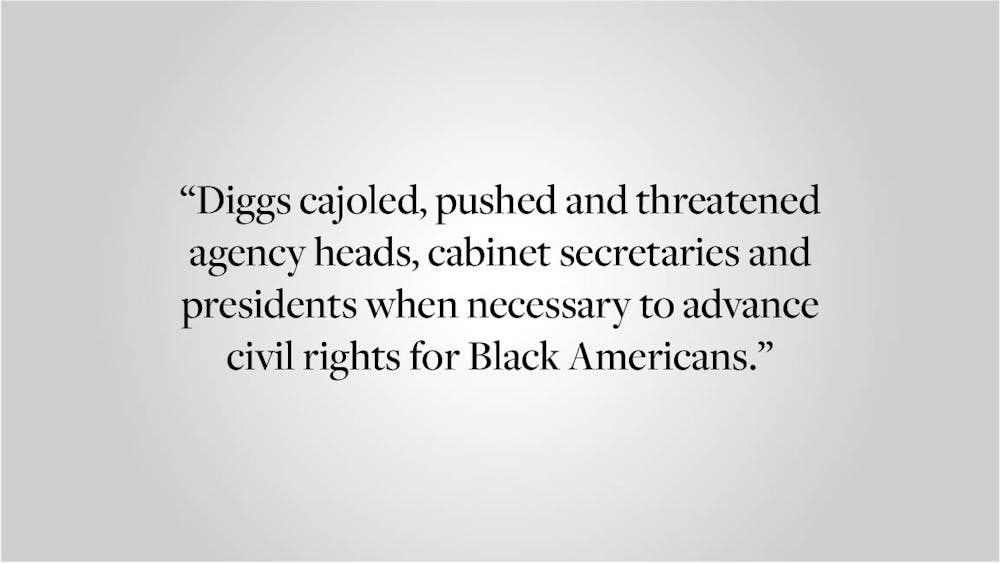The civil rights movement transformed the United States. While there were many reasons for its success, nothing was more important than the rise of strong African American leaders who displayed great courage in confronting injustice and righting past wrongs. They publicized racial inequities and built coalitions that won great change for Black America. Many of the era’s Black leaders are household names, some are national heroes while others have been forgotten.
As we take a moment to reflect on Black History Month, now is an appropriate time to remember Congressman Charles C. Diggs, Jr. of Michigan, perhaps the most consequential Black legislator to ever serve in the U.S. Congress but a legislative lion who has fallen out of sight.
Born in Detroit in 1922, the scion of a prosperous mortician and politician, Diggs was elected to the House of Representatives in 1954. When he was sworn into office in January 1955, there were only two other Black members of Congress — Adam Clayton Powell of New York City and William L. Dawson of Chicago. Three Black representatives out of 531 members! Their small number limited their ability to influence legislation, but each advocated for reforms to help African Americans in their own special way.
Diggs was catapulted into the national spotlight in the summer of 1955 when he traveled to Mississippi as an unofficial observer of the trial of the two white men who murdered 14-year-old Emmett Till. Several Black individuals testified against the two defendants (they were acquitted) and later told friends and relatives that the presence of the Black congressman gave them the courage they needed to go through with their testimony. Diggs saw himself as congressman at-large for the 24 million Black Americans, particularly those ignored by their elected representatives in the South.
Diggs cajoled, pushed and threatened agency heads, cabinet secretaries and presidents when necessary to advance civil rights for Black Americans. For example, in the 1950s, when commercial air travel was in its infancy, Diggs used federal oversight to force local authorities throughout the U.S. to desegregate their airport terminals. Today, there is a permanent exhibit in the Smithsonian Air and Space Museum recognizing Diggs’ contribution to commercial air travel.
In 1969, Diggs organized the Democratic Select Committee as a way to facilitate communication between the then six Black members of the U.S. House of Representatives. In 1971, with nine members, the group was renamed the Congressional Black Caucus with Diggs as its first chairperson. The group immediately caught the attention of the country after it boycotted President Richard Nixon’s State of the Union address to protest his refusal to meet with them. Nixon eventually met with Diggs and the CBC. Today, the 58-member CBC is perhaps the most important organization in contemporary Black politics.
In 1957, Diggs became the first Black member of Congress to travel to Africa. A year later, he became the first Black member of the House Foreign Affairs Committee. From this position, and later as chairperson of the Subcommittee on Africa, Diggs ignited, virtually alone, what little congressional interest there was in the continent. In 1971, he became the first Black member of Congress to visit South Africa. Diggs’ visit helped raise awareness about South Africa’s racist apartheid policy; in fact, much of the early work in the American anti-apartheid movement was led by Diggs. He was the visionary and leader in the formation of Trans Africa, the powerful Black-led American advocacy organization that helped to end apartheid in South Africa.
Washington, D.C.’s Mayor Muriel Bowser is part of Diggs’ tremendous legacy. Prior to 1973, Congress made all of the laws for the District of Columbia, and the President of the United States appointed the mayor and other city executives. The fact that “The District” had a sizable Black population and was heavily Democratic led many Republican and Southern members of Congress to oppose the idea of installing a popularly-elected local government. But in 1973, Diggs became the first Black chair of the House Committee on the District of Columbia, and from his position, he became the architect of “home rule” in Washington, D.C. Diggs’ leadership brought local democracy to the hundreds of thousands of D.C. residents.
But Diggs’ illustrious career was marred by personal troubles that eventually ruined him — which is probably why his name is invoked so infrequently today. He went to federal prison for salary kickbacks after being hounded out of Congress in 1980 by freshman Georgia representative Newt Gingrich. Diggs served seven months in prison. He died on Aug. 24, 1998.
Despite the scandal that led to his political fall, Diggs’ career deserves recognition. Diggs worked across party lines. He established strong ties with civil rights organizations and other groups outside of Congress. Diggs’ political career is a useful reminder of how coalitions get built and progress is made.
Marion Orr is the Frederick Lippitt Professor of Public Policy and Professor of Political Science and Urban Studies at Brown University. He is completing the first biography of Diggs, The House of Diggs: The Untold Story of Congressman Charles C. Diggs, Jr.’s Activist Leadership – From Emmett Till to Anti-Apartheid – And the Scandal that Nearly Erased a Legacy of Social Justice.





